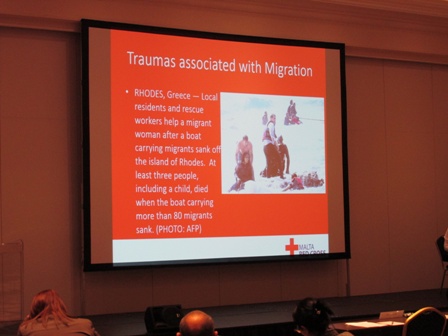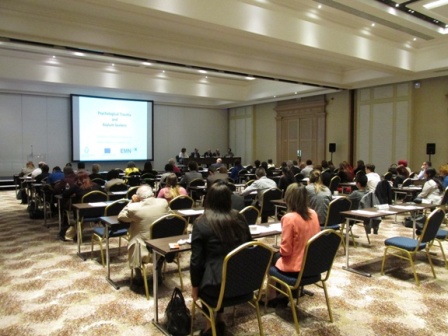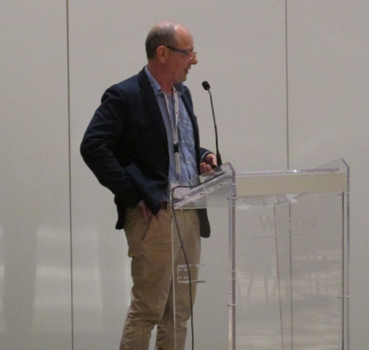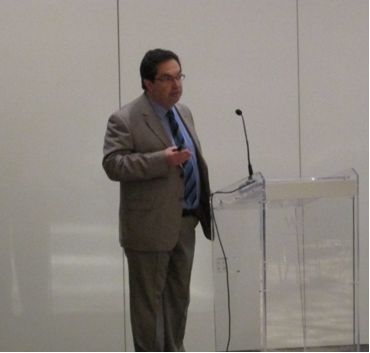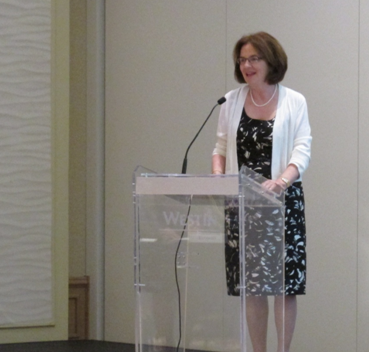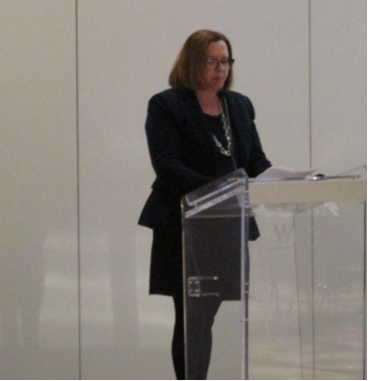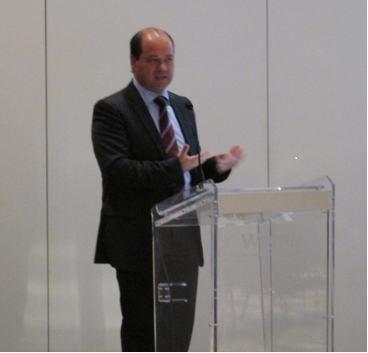PSYCHOLOGICAL TRAUMA AND ASYLUM SEEKERS
SEMINAR 2ND MAY 2016
The seminar was opened by Mr. Julian Micallef, from the Third Country Nationals Unit – Ministry for Home Affairs and National Security. He explained that this seminar was a follow-up of a previous one, held in September 2015.
An overview of the European Migration Network was given by Ms. Anna Catania, who described its tools and outcomes, especially the importance of the Ad Hoc Queries and Annual Reports, together with its 4 annual studies.
Main outputs of the Malta National Contact Point during the previous months were highlighted, including the publishing and issuing of the EMN Asylum and Migration Glossary, which was also presented to the library of the University of Malta, the EMN Malta NCP Newsletters and the events organised, such as seminars and annual conferences.
Dr. Anton Grech, Chairman of the Psychiatry Department at the Ministry of Health in Malta, opened the actual technical part of the seminar by interlinking three aspects: physical wellbeing, psychological wellbeing and the spiritual wellbeing. He pointed out the fact that there is a difference between a person being fit and a person being healthy. Dr. Grech stated that the seminar holds a common denominator, due to tragedies of asylum seekers’ and their justified reasons for leaving their homes, and the impact on those working with them. This has been witnessed time and again with PTSD (Post Traumatic Stress Disorder) and complete burnout of those working in close contact on daily basis, at times for months or even years on end, which finally makes one wonder who is the strongest – those involved in dealing with migrants or the migrants’ themselves.
That question led to the first presentation given by Dr. Walter Busuttil, who for the second time round participated in a Malta EMN NCP seminar. His presentation focused on The Psychological Effects of War on Asylum Seekers. He started his presentation focusing on the new type of warfare, where non-conventional tactics are the norm and where everyone is involved and civilians are being increasingly targeted and attacked. This obviously has its repercussions of direct or indirect trauma, of being physically targeted and the repercussions of such attacks on civilians, while the indirect part focuses on the loss of loved ones, loss of home, one’s community, increase of disease and possible famine. Other repercussions encompass the complex trauma such as kidnapping, hostage taking, rape, ethnic cleansing, mass murder, chronic fear and persecution, apart from obvious famine and disease. Such factors normally bring out various types of psychological disorders, varying from pre-migration stress, immediate post migration stress, and the issue of requesting asylum and possibility of deportation, adjustment to a new life, and the reconstruction and rebuilding of a new life, basically from scratch. Dr. Busuttil’s presentation went on to describe the various hardships, especially the issue of the use of rape as a weapon of war, as already happened in many conflicts in various regions around the world, and the repercussions of such and many other abuses on the victims. These abuses present themselves in various sorts of PTSD once victims of such abuses reach a safe haven. It was highlighted that PTSD normally became evident only after 2 years from the end of the actual traumatic experiences, when repercussions started to emerge. Obviously even though within a retroactive manner, such repercussions had to be tackled before the situation worsened.
Another presentation with a more on-the-ground technical aspect was given by a Malta Red Cross Society’s Refugee Support Services Manager Mr. Glen Cachia. The presentation was titled: Red Cross – Assistance along the migratory trail. This presentation started with a brief overview of the IFRC (International Federation of the Red Cross) and the ICRC (International Committee of the Red Cross) followed by the work carried out by the MRC within the context of irregular migrants and asylum seekers. The presentation highlighted MRC’s role during the 2011 Libya crisis, the new migratory routes and the new increased migration flows, as well as the new challenges to migrants along the migratory trail, of which amongst others: limited access to rights and services, arbitrary arrests and detention, violence and human trafficking, family separation and loss of family links and the repercussions of such separation, the consequences of such separation for women and children (often the real victims of war) and last but not least deaths during the journey. The services offering mental health and psychosocial support derived from the Geneva Convention were also discussed in the said presentation. Another aspect of the RC work vis-à-vis immigrants and asylum seekers focused on the various services offered both by MRC and other National Societies, which include the following: Telephone services, psycho-social needs, identification/registration/ safe messages/well messages of particularly vulnerable individuals, Red Cross Messages (RCM), tracing requests and family links website. Other services include: Hotline/Call centres, available lists of boat survivors, links with the forensic lab at Mater Dei Hospital morgue, megaphone announcements and organisational activities.
All these activities undoubtedly carry repercussions on the people working with immigrants, and this delicate issue was expertly discussed by Dr. Angela Busuttil through her presentation titled: Psychological Trauma and Asylum Seekers -Staff Support.
Dr. Busuttil opened her presentation by giving a short overview of her doctorate background and her area of expertise within the Sussex Partnership. She then moved on to highlight the range of challenges encountered where support to asylum seekers and immigrants by staff is concerned, within the various entities such as: rescuers and emergency workers, those processing applications, therapy staff and social workers, interpreters and those working in facilities where asylum seekers are detained or living. She discussed why staff needs support, how organizations dealing with immigration issues can support its staff, and how staff and teams can support themselves. However it was noted that although there is much need for such support, evidence exists that many organizations including NGOs involved with relief work, actually struggle to obtain support services for their staff. Psychological support for staff is important especially where guilt issues following a rescue are present, such as in cases of fire-fighters post a tragedy, the rescue workers after a boat capsizes and people drown, especially in case of children’s deaths. There are other problems which, if not addressed in time, can have serious psychological repercussions on those working with immigrants, which were accurately described as: “The Drops Of Rain Make A Hole In The Stone, Not By Violence But By Oft Falling”. This happens when people are continually exposed to trauma, distress situations, with lack of rest or relaxation, which makes the drops of rain in the hole oft falling actually become a problem. Such as when in 2013, a UNHCR study showed that 47% of such staff experienced difficulty sleeping and 57% reported symptoms of “sadness, unhappiness, or emptiness”. These types of symptoms are also common within the so-called ‘hidden staff’, such as interpreters, and other staff such as case workers who come face-to-face with traumatic stories and those working in psychological support. The end result of such situations is that without risk assessment, training or intervention is unlikely to have the expected impact. This also highlights the importance of deciphering between physical well being and the mental wellbeing which if not made can give way to PTSD as soon as the first traumatic experiences are encountered. Screening of staff could be a way forward and although not proven to prevent problems in staff, it may help identify both to individuals and to the organisation additional support requirements, with feedback to the organisation in case of problems and links to assessment and support if needed.
A Q&A time was given after each presentation, where those present put forward either salient questions or made certain points, which were duly addressed by the panel.
Definitely this seminar although quite tough in itself, due to the nature of the topic in discussion, was extremely interesting and it definitely did not leave participants indifferent to the various problematic aspects of immigration and mental health issues which is definitely not a topic often discussed. But for those involved, those actually hooked on migration work, was an eye-opener in more ways than one.
The European Migration Network (EMN) is co-ordinated by the European Commission with National Contact Points established in each EU Member State plus Norway.
